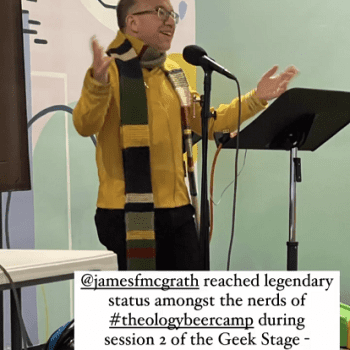I have written several contradictory things over the years about the notion of a slippery slope, but one of them focused on the idea of a “radical middle,” where one tries to maintain their balance with slippery slopes on both sides.
A friend and I, after the Clark Pinnock tribute at AAR/SBL, were chatting about how the Evangelical Theological Society and conservative evangelicalism in general seem to have a special radar for folks who in their view are moving to the left theologically. A set of expressions came to my mind and I want to flesh them out here:
Among conservative evangelicals moving to the right seems never to be wrong.
Moving to the left, however, is either on the way to being wrong or is in fact already wrong (for the right).
To the left is a slippery slope, to the right is faithfulness (even if it is extreme).
I wish to challenge the very notion that going to the right is never wrong, and I want to contend that going left is sometimes the right thing to do…
Here’s my thesis: the slippery slope, if there is one, is one both sides. The middle, the Third Way, takes the courage of commitment to faithfulness and the willingness to join Jesus, Paul and Peter to progress when God’s Spirit guides. The right embraces the first and fails at the second. By the way, liberals embrace the second one and fail on the first. What I’ve said here can be said in reverse about many in the American Protestant liberal tradition.
We might disagree about where the middle is. And see too the post by RJS on whether moving to the left is always right. But I nonetheless think it is very significant to have a prominent Evangelical emphasizing that not only is there middle ground, but that the best place to be is somewhere in the middle, rather than gravitating towards one extreme believing that a slippery slope lies only in the other direction.
Let me share a quote from that post I wrote some years ago, which I mentioned earlier, and which was inspired by the book Dangerous Words: Talking About God in the Age of Fundamentalism by Gary Eberle:
The Buddha spoke of the middle path. Jesus spoke of the narrow way. I am inclined to envisage the narrow way as one that runs right down the middle of the broader thoroughfare. We most often hear warnings about the “slippery slope” from people who are persuaded they occupy the moral high ground, who claim that once you lose it, you will be with the godless liberals and atheists at the bottom of the cliff face, wishing you could get back up, but unable to. In reality, it seems more plausible to envisage a narrow road with a slope on either side, so that the closer you get to the edges, the more likely you will slip down the sides. The image here is of a stable middle ground between extremes that represent the ‘low points’ towards which one “gravitates” unless one is determined to keep to the middle and maintain balance.
…I am hoping to start a conversation. I’m trying to occupy the “radical middle”, and I mean it seriously when I say this is radical. If you are an extremist, you have critics largely on one side, and you are probably so far away from them in your presuppositions that none of their criticisms will carry any weight – assuming any of them take you seriously enough to engage you in discussion. For those in the middle, criticisms will come from both sides, and the criticisms will often have points that we can and should learn from.
Maintaining balance takes challenge, whether you are walking a tight rope, riding a bike, governing a country or formulating ways to express your faith. If those who are passionate about the middle (whether politically or theologically) united in some public and organized fashion, and work together, what might be accomplished?
Before ending, let me add links to a couple of other relevant posts around the blogosphere. Tony Jones offers a quote from the famous Evangelical New Testament scholar F. F. Bruce, to the effect that he could not have done the honest scholarship he did if he had worked in a confessional setting. And Michael Dowd posts on how critics of religion like Richard Dawkins can help provoke an “Evidential Reformation” that can help us “break free of the idolatry of the written word.”













